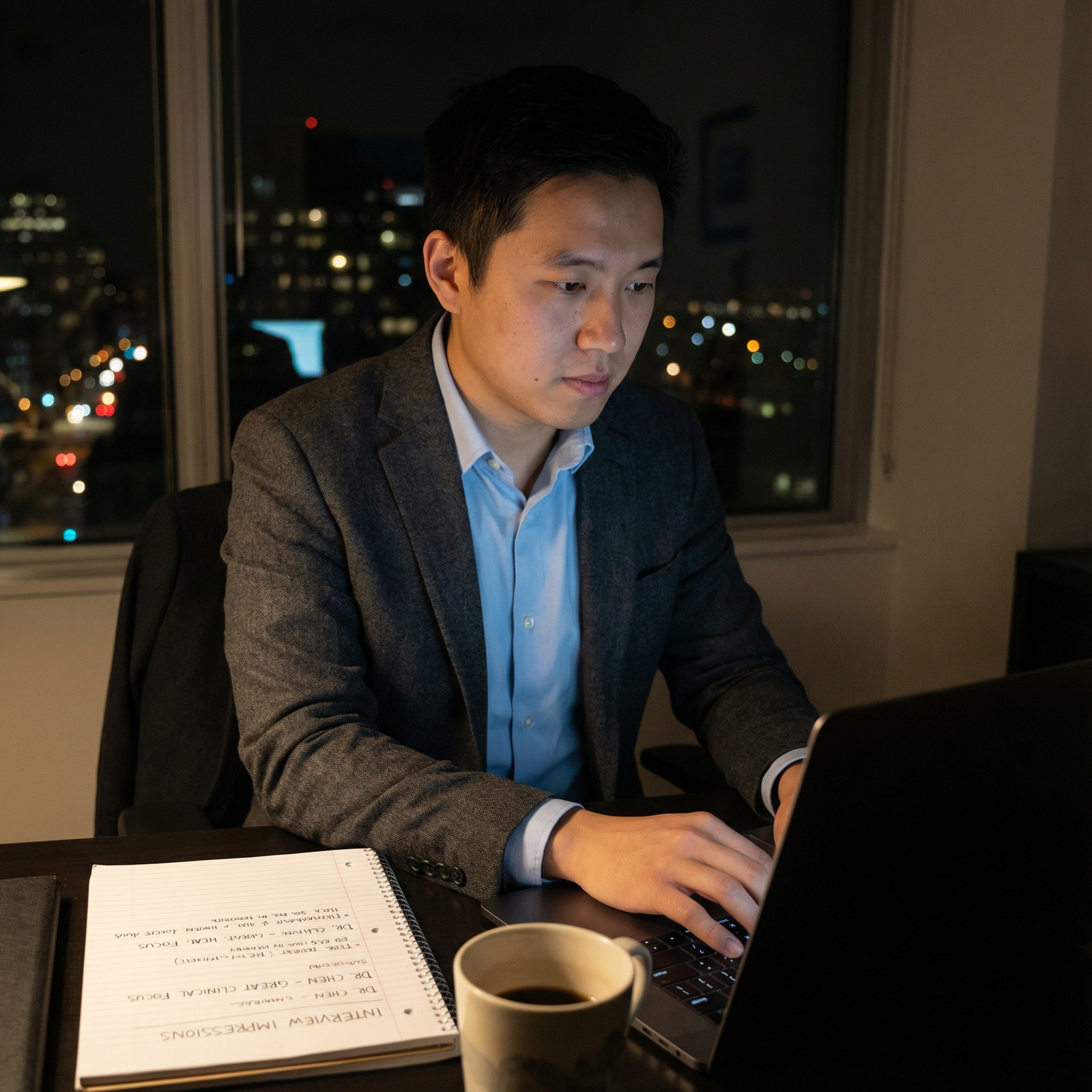
Understanding Fellowship Interviews in Today’s Training Environment
For many residents, fellowship represents the bridge between residency training and a focused, long-term career in a subspecialty. It can open doors to advanced clinical practice, academic positions, leadership roles, and other high-impact healthcare careers. Among all components of the application, the fellowship interview is often the most decisive.
Fellowship interviews are not simply a formality; they are where programs verify your clinical readiness, assess your potential as a colleague, and decide how you will contribute to the fellowship community. How you present yourself—your judgment, communication, insight, and professionalism—can make the difference between an average and standout application.
This guide expands on core strategies to help you shine as a candidate. We will walk through how to understand the interview structure, prepare strategically, present yourself effectively, and follow up professionally to maximize your chances of success.
The Fellowship Interview Process: What Programs Are Really Evaluating
Fellowship interviews vary by specialty and institution, but most share common goals: to determine how you think, how you work, and whether you are a good fit for the program’s culture and priorities.
Common Interview Formats
You may encounter a combination of the following:
One-on-One Interviews
Typically 20–30 minutes with a faculty member, program director, or division chief. These allow deeper exploration of:- Your clinical background and core experiences
- Your research interests and career trajectory
- Your fit with the faculty member’s own interests (e.g., shared research focus)
Panel Interviews
A group of 2–4 interviewers may jointly ask questions. This setting tests:- Your ability to maintain composure with multiple observers
- How you balance attention among different stakeholders
- Your communication style when questions come from different angles
Group or “Round-Robin” Interviews
Some programs use small group discussions or rotate you through multiple short interviews in rapid succession:- You may be observed interacting with other candidates
- You might be asked to discuss an article, a case, or a hot topic in the specialty
- Programs evaluate your collegiality, leadership, and team dynamics
Virtual Interviews
Now common across many specialties:- Require technical preparation (lighting, sound, background)
- Heighten the importance of eye contact (looking at the camera) and concise communication
- May involve breakout rooms for brief, timed conversations
Situational and Behavioral Question Styles
Many programs incorporate behavioral and situational questions to evaluate your decision-making and professionalism:
Ethical and Clinical Scenarios
Example: “Tell me about a time you disagreed with an attending about a patient care plan. How did you handle it?”
Programs assess whether you:- Maintain patient-centered care
- Show respect for hierarchy while advocating appropriately
- Use evidence-based reasoning and communication
Teamwork and Conflict
Example: “Describe a conflict you had with a colleague and how it was resolved.”
Interviewers look for:- Insight into your own behavior
- Emotional regulation and professionalism
- Willingness to seek feedback and compromise
Resilience and Burnout
Example: “Tell me about a time you felt overwhelmed or burned out. What did you do?”
Programs want to know:- How you cope with stress
- Whether you recognize limits and ask for help
- If you have sustainable strategies for a demanding fellowship environment
Core Areas Interviewers Focus On
Across specialties, three domains consistently matter:
Clinical Knowledge and Judgment
You should be able to:- Discuss complex cases relevant to the fellowship
- Explain your reasoning, not just the final decision
- Recognize uncertainty and talk through how you’d manage it
Research and Scholarly Activity
Particularly in academic programs, expect questions about:- Your past research roles (not just titles listed on your CV)
- What you learned from specific projects or failures
- How you envision building a scholarly niche during fellowship
Personal Qualities and Professionalism
Programs are recruiting future colleagues. They look for:- Reliability, maturity, and accountability
- Team orientation and emotional intelligence
- Curiosity, humility, and a growth mindset
Interviewers are not just asking “Can you do the work?” but also, “Would we want to work with you for the next 2–3 years?”
Strategic Preparation for Fellowship Interviews
Effective interview preparation is a form of professional development in itself. You are learning to articulate your story, refine your goals, and present your clinical identity clearly and confidently.

1. Deep-Dive Research on Each Fellowship Program
Generic preparation is not enough for competitive fellowship interviews. Tailor your approach to each program:
Understand the Curriculum and Clinical Structure
- Review the program’s website thoroughly:
- Clinical rotations and call structure
- Required vs. elective time
- Exposure to procedures, advanced therapies, or unique populations
- Ask yourself:
- How does this training model fit my goals?
- What unique experiences does this program offer (e.g., global health track, quality improvement track, advanced imaging, etc.)?
Map Your Interests to Faculty and Projects
- Identify key faculty:
- Read 2–3 recent publications of those you are likely to meet
- Note themes: clinical trials, health services research, basic science, medical education, quality improvement
- Prepare a brief statement of how your current interests intersect with theirs:
- “I was particularly interested in your work on [topic], and I’d love to explore how fellows can get involved in similar projects.”
Align With the Program’s Mission and Culture
- Look at:
- Mission and values on the website
- Diversity, equity, and inclusion initiatives
- Community engagement or global health commitments
- Prepare examples from your experience that reflect:
- Commitment to underserved populations
- Interest in mentorship and teaching
- Participation in quality, safety, or systems-improvement work
This level of research not only prepares you to answer “Why our program?” but also helps you assess whether the program truly matches your values and career plans.
2. Practice Common Fellowship Interview Questions
Practicing aloud—ideally with a mentor, peer, or mock interview panel—is one of the most high-yield steps in interview preparation.
Examples of High-Yield Questions
Clinical and Professional Identity
- “Tell me about a complex case that changed how you practice.”
- “What are your strengths and areas for growth as you enter fellowship?”
Research and Academic Goals
- “Describe your most meaningful research project and your specific role.”
- “What kind of scholarly work do you want to pursue in fellowship?”
Career Trajectory and Fit
- “Where do you see yourself in 5–10 years, and how will our fellowship help you get there?”
- “What other careers would you consider if not this subspecialty?”
Behavioral and Values-Based Questions
- “Tell me about a mistake you made and how you addressed it.”
- “Describe a time you advocated for a patient in a challenging situation.”
Practice answering until you can respond clearly, without sounding scripted. Focus on concise, structured answers (about 1–2 minutes) that showcase reflection and growth.
3. Use the STAR Method to Structure Behavioral Responses
The STAR method (Situation, Task, Action, Result) is an efficient way to organize your thoughts, especially under pressure.
- Situation: Brief background context
- Task: Your responsibility or role
- Action: What you specifically did
- Result: Outcome, including what you learned or changed
Example (Improving Clinic Efficiency):
- Situation: “During my second year of residency, our continuity clinic was frequently running 60–90 minutes behind schedule.”
- Task: “As a senior resident, I was asked to identify the main contributors to the delay and propose changes.”
- Action: “I performed a small process-mapping exercise, tracked rooming times, and worked with nursing staff to pilot a pre-visit planning checklist.”
- Result: “Within two months, we reduced average clinic delays by 25 minutes and improved patient satisfaction scores. The clinic adopted pre-visit planning as a standard practice, and I presented the project at our quality-improvement conference.”
Always conclude with reflection: “This experience taught me how small system changes can significantly affect patient experience and team morale, and it sparked my interest in quality improvement projects during fellowship.”
Prepare 6–8 STAR stories drawn from:
- Clinical cases
- Research projects
- Leadership or committee roles
- Teaching experiences
- Conflict or error management Many of your responses can be adapted from this core set of stories.
4. Prepare for Ethical Dilemmas and Situational Judgment
Ethics and professionalism feature prominently in modern medical education and fellowship interviews.
How to Approach Ethical Questions
When presented with an ethical dilemma, walk through your reasoning:
Clarify the Conflict
Identify the competing values (e.g., autonomy vs. beneficence, resource allocation, confidentiality).Gather Information
Describe what additional information you would seek: patient preferences, legal requirements, institutional policies, consultation with ethics or risk management.Apply Principles and Guidelines
Reference:- Standard ethical principles (autonomy, beneficence, non-maleficence, justice)
- Relevant guidelines (e.g., specialty society recommendations)
Communicate and Collaborate
Emphasize:- Clear, compassionate communication with patients and families
- Involvement of the team, supervisors, or ethics committee as appropriate
Reflect
Acknowledge that many ethical cases have no “perfect” solution, but that process and transparency matter.
Programs are less interested in the single “correct” answer and more in whether you demonstrate maturity, patient-centered care, and thoughtful reasoning.
Performing at Your Best on Interview Day
Once you have prepared your content, attention shifts to delivery: how you appear, communicate, and connect.
1. Professional Appearance: Signaling Respect and Readiness
- Dress Code:
- For both virtual and in-person interviews, wear formal business attire (e.g., suit, conservative blouse or shirt, closed-toe shoes).
- Grooming and Presentation:
- Neat, professional grooming communicates reliability and respect for the process.
- Virtual-Specific Tips:
- Choose a quiet, well-lit space with a neutral background.
- Test your camera, microphone, and internet connection in advance.
- Position your camera at eye level and avoid distracting backgrounds.
Professional appearance is not about fashion; it is about signaling that you take this opportunity—and your future colleagues—seriously.
2. Projecting Confidence, Professionalism, and Collegiality
Fellowship training is intense and collaborative. Programs want someone they trust on call, on rounds, and in conference.
Verbal Communication
- Speak clearly and at a measured pace.
- Avoid excessive jargon; explain complex points succinctly.
- Be honest when you do not know something: “That’s an area I’d like to learn more about, but here’s how I would begin to approach it.”
Nonverbal Communication
- Maintain open posture and comfortable eye contact.
- Nod and use brief verbal cues (“I see,” “That makes sense”) to show engagement.
- In virtual settings, look toward the camera when speaking to simulate eye contact.
Emotional and Professional Tone
- Aim for calm, thoughtful, and engaged rather than overly rehearsed.
- Show humility and willingness to learn, especially when discussing strengths or accomplishments.
- When describing difficult situations, avoid blaming; focus on your role, learning, and growth.
3. Demonstrating Genuine Passion for Your Chosen Specialty
Programs usually differentiate strong candidates by their clarity of purpose and authentic enthusiasm.
Tell Your Specialty Story
Be able to answer:
- “Why this subspecialty?” with:
- A few formative clinical experiences
- Specific aspects of the field that excite you (e.g., longitudinal patient relationships, procedures, research questions)
- Avoid vague responses: ground your answer in real patients, mentors, rotations, or research projects.
Connect Passion to Future Contribution
Clarify how you want to contribute to:
- Patient care (e.g., “I’m particularly drawn to caring for [population] because…”)
- Education (e.g., “I hope to be involved in resident teaching and curriculum development.”)
- Research or systems change (e.g., “I’d like to focus on improving transitions of care for [population].”)
Passion that is linked to realistic, thoughtful goals is compelling and memorable.
4. Asking Insightful Questions That Show Maturity and Fit
Your questions are part of your interview performance. They demonstrate how you think about training, mentorship, and long-term development.
Consider asking about:
Clinical Experience and Autonomy
- “How is fellow autonomy balanced with supervision, particularly on overnight or high-acuity services?”
- “What kinds of patients or procedures do fellows see uniquely compared with residents?”
Research and Scholarly Support
- “What structures are in place to help fellows develop and complete scholarly projects?”
- “Do fellows receive support for conference presentations or research dissemination?”
Mentorship and Professional Development
- “How are mentors assigned or chosen, and how often do fellows typically meet with them?”
- “What career paths have recent graduates pursued—academic, community practice, other healthcare careers?”
Wellness and Work–Life Integration
- “How does the program support well-being and prevent burnout during fellowship?”
- “What is a typical weekly schedule during the most demanding rotations?”
Avoid questions that suggest you have not done your homework (e.g., basic info clearly listed on the website). Instead, use your research to ask deeper, more specific questions.
After the Interview: Professional Follow-Up and Self-Reflection
Your work is not done when you leave the interview room or log off Zoom. The post-interview phase is part of your overall professionalism and medical education journey.

1. Sending Thoughtful, Timely Thank-You Messages
Within 24–48 hours, send individualized emails to your interviewers (or to a program coordinator for distribution, if requested).
Key Elements of a Strong Thank-You Email:
- Specific reference to your conversation:
- “I appreciated our discussion about fellows’ involvement in [clinic/research area].”
- Reaffirmed interest:
- “Speaking with you reinforced my strong interest in your program, particularly in its emphasis on [feature].”
- Professional, concise tone (1–2 short paragraphs).
Sample Email (Refined):
Subject: Thank You for the Fellowship Interview
Dear Dr. [Last Name],
Thank you for taking the time to speak with me during my interview for the [Fellowship Name] at [Institution]. I especially appreciated our discussion about [specific topic—e.g., fellows’ role in the multidisciplinary [clinic/team] and opportunities for [research/teaching/quality improvement]].
Our conversation reinforced my enthusiasm for your program’s commitment to [program value—e.g., patient-centered care, academic mentorship, innovation in medical education]. I would be honored to contribute to and grow within your team.
Thank you again for your time and consideration.
Sincerely,
[Your Name], MD
[Current Institution]
Keep copies of your emails and note any specific follow-up items you mentioned.
2. Reflecting Systematically on Each Interview
Soon after each interview day, jot down notes while details are fresh:
- What impressed you most about the program?
- What concerns do you have (e.g., workload, location, support systems)?
- How well did your clinical and research interests align?
- How did you feel about the culture and interactions with fellows?
For your own professional development, also ask:
- Which questions did I answer well?
- Which questions caught me off-guard, and how could I respond better next time?
- Did I clearly communicate my goals and interests?
This reflection will help you:
- Adjust your interview preparation as the season progresses
- Create a more accurate and authentic rank list
- Identify areas to focus on in your ongoing professional development
Frequently Asked Questions About Fellowship Interviews

1. How should I handle difficult or unexpected questions during a fellowship interview?
When faced with a challenging question:
- Pause briefly to gather your thoughts; a 2–3 second silence is acceptable and can help you stay organized.
- Clarify the question if needed: “Just to be sure I understand, you’re asking about…”
- Use a structured approach (e.g., STAR for behavioral questions, systematic reasoning for clinical or ethical scenarios).
- If you truly don’t know, be honest:
- “I’m not certain of the exact answer, but I would start by… [describe how you’d approach the problem, which resources you’d use, or who you’d consult].”
Interviewers respect humility and sound reasoning far more than overconfidence or guessing.
2. How much specialty-specific or technical content should I review before interviews?
You do not need to study as if for a board exam, but you should:
- Be comfortable discussing:
- Common and important conditions in the subspecialty
- A few key recent trials or guidelines in your area of interest
- Be able to explain your past clinical and research work in technical detail appropriate to your level:
- For research, know your methods, limitations, and key findings
- For clinical work, be prepared to walk through a case, your assessment, and management rationale
Updating yourself on 2–3 recent landmark papers or guidelines in the field is a good interview preparation strategy and a step in your ongoing medical education.
3. How much should I research individual faculty before the interview?
You do not need to memorize everyone’s CV, but it is valuable to:
- Identify:
- Key faculty whose work aligns with your interests
- The program director, associate director, and division chief
- For those individuals:
- Skim their faculty profile and a couple of recent publications
- Note specific projects you might reference in conversation
This preparation shows initiative and helps you ask more focused questions, particularly about mentorship and scholarly work.
4. Is it appropriate to signal strong interest or “rank intentions” during interviews?
Practices vary, and you must follow Match and specialty-specific guidelines:
- It is acceptable to express sincere enthusiasm:
- “Your program is one of my top choices because…”
- “I could see myself thriving here given the strong alignment with my clinical and research goals.”
- Avoid making explicit promises or asking them for ranking assurances, as this can be unprofessional and may violate match policies in some specialties.
- After interviews, you may send a brief update or interest letter, if allowed, but it should be honest, professional, and non-coercive.
When in doubt, review the official Match communication guidelines for your specialty and seek mentorship from your program leadership.
5. What if I feel my application is less competitive—can the interview still make a difference?
Yes. The interview often carries substantial weight because it reveals:
- Your interpersonal skills and professionalism
- Your insight, resilience, and potential for growth
- How well your goals match what the program can offer
If you perceive your application as less competitive (e.g., lower test scores, interruptions in training):
- Prepare to speak candidly and constructively about any challenges:
- Frame them in terms of insight and growth rather than excuses.
- Emphasize strengths that may not be obvious on paper:
- Clinical excellence, strong teamwork, unique life experience, or robust quality-improvement work.
- Demonstrate a clear, well-thought-out plan for your professional development during fellowship.
A thoughtful, mature, and authentic interview can significantly elevate your candidacy and set you apart from other applicants.
Interviewing for fellowships is both an evaluation and an important step in your broader professional development. With deliberate interview preparation, clear communication, and purposeful reflection, you can present the best version of yourself—and choose a fellowship that truly supports your long-term goals in medicine and healthcare careers.




















